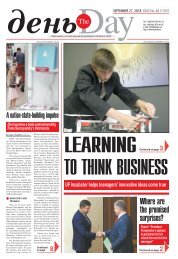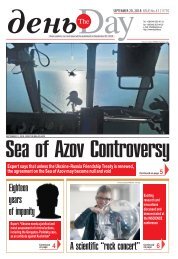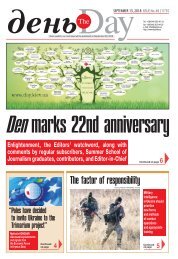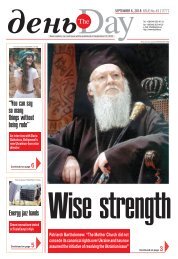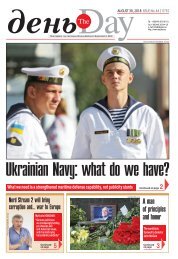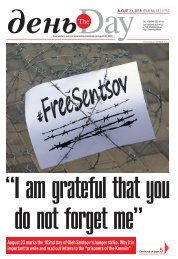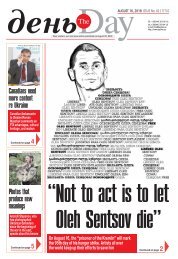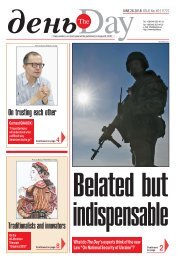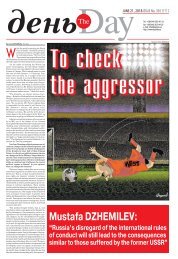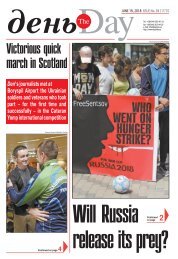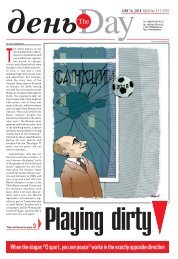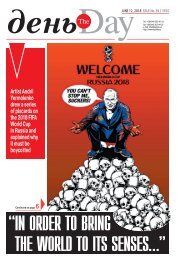41_1-8
Create successful ePaper yourself
Turn your PDF publications into a flip-book with our unique Google optimized e-Paper software.
6<br />
No.<strong>41</strong> AUGUST 9, 2018<br />
CLOSE UP<br />
WWW.DAY.KIEV.UA<br />
By Khrystyna SAVCHUK,<br />
Anastasiia KOROL, Den’s Summer<br />
School of Journalism, 2018<br />
The Ukrainian team which will<br />
compete in the Invictus Games in<br />
Sydney at the end of October<br />
started its second training session<br />
on August 7. Let us recall that our<br />
team will participate for the second<br />
time in this international competition for<br />
wounded soldiers which was founded by<br />
Prince Harry. Overall, various sports<br />
events for veterans are held almost on a<br />
weekly basis, because this is the best and<br />
most accessible way of rehabilitating<br />
wounded soldiers. Presidential<br />
Commissioner for Rehabilitation of<br />
Wounded Anti-Terrorist Operation<br />
(ATO) Soldiers Vadym Svyrydenko<br />
talked to Den/The Day about it before.<br />
And recently, Svyrydenko joined his<br />
assistant Kostiantyn Vinnichenko as<br />
they became lecturers at Den’s Summer<br />
School of Journalism.<br />
This conversation was special in<br />
that we heard many frank stories that<br />
helped us understand how and why people<br />
become soldiers, risk their lives in the<br />
war, and how they then return to peaceful<br />
life. Back during the meeting, an idea<br />
emerged of creating – together with<br />
students of the Summer School – a club<br />
of sports journalists, dedicated to telling<br />
about the veterans’ competitions. Indeed,<br />
their victories inspire not only other<br />
soldiers, but also ordinary people. So<br />
watch out for this initiative developing.<br />
In the meantime, read about the transfer<br />
of experience between different generations<br />
of soldiers, people finding their<br />
vocations at the front, and why there is<br />
always a place for the creation of new<br />
things in war.<br />
● “PEOPLE WHO HAVE BORNE<br />
ARMS UNDERSTAND EACH<br />
OTHER”<br />
How to get out of the war’s grip<br />
Vadym Svyrydenko and Kostiantyn Vinnichenko talked about<br />
it using real-life examples at Den’s Summer School of Journalism<br />
Olha KRYSA, Ivan Franko National<br />
University of Lviv: “The membership<br />
of the Ukrainian team, which is<br />
to compete in the Invictus Games in Sydney<br />
this fall, is already known. There is<br />
a certain association in people’s minds<br />
which sees men alone as participants of<br />
such competitions. But they are not<br />
alone in it, and the national team includes<br />
women as well. Can you tell us<br />
more about female participants in international<br />
veteran competitions?”<br />
Vadym SVYRYDENKO: “We even<br />
ask women to apply for such competitions<br />
as much as possible. Women can<br />
take part in the Invictus Games as well.<br />
Olha Benda was among them, having<br />
served as a cook of the 72nd Separate<br />
Mechanized Brigade and lost her leg. She<br />
had a sports prosthetic leg made. She got<br />
interested in participating in the selection,<br />
but wanted to go back to the front<br />
line again, so she did not even plan to go<br />
to Australia at first.”<br />
Anastasiia KOROL, Vasyl Stus<br />
Donetsk National University: “Why is<br />
it important for you to get Ukrainian<br />
soldiers to participate more actively in<br />
such competitions?”<br />
Kostiantyn VINNICHENKO: “First<br />
of all, this country had no experience of<br />
military operations since independence.<br />
The state should provide all the resources<br />
so that a wounded soldier would<br />
not only get adapted to peaceful life, but<br />
could as much as possible take care of<br />
themselves, be an equal member of society.<br />
They did not pay attention to it in<br />
the Soviet time. They created dedicated<br />
residential facilities for people who became<br />
disabled. It was only on May 9, the<br />
Victory Day, that they spoke about the<br />
veterans’ heroism. But international<br />
experience has come to Ukraine thanks<br />
to sports. This is the first such huge platform<br />
providing our lads with a way to<br />
understand each other, and this is not a<br />
political system. Through sports, war<br />
veterans can adapt quickly, get help<br />
and understand that they can become<br />
equal members of society within a short<br />
period of time.<br />
“Wounded lads do not just need<br />
help. They need the opportunity to<br />
choose any path they like, access any profession,<br />
new knowledge. When they will<br />
get it, we the public will get a new impetus.<br />
Civilians also get certain signals<br />
when they see the emotional experience<br />
of lads who have been through tough<br />
times. They team up around veterans,<br />
and so changes may begin in Ukraine.”<br />
Mariia PROKOPENKO: “By the<br />
way, do the Afghan war veterans join<br />
your initiatives?”<br />
V.S.: “We do not draw any dividing<br />
lines between people who have gained<br />
combat experience. There are various<br />
communities. Some of them are closed,<br />
made of people who do not want to join.<br />
A certain number of ATO veterans had<br />
fought in Afghanistan as well. People<br />
who have borne arms understand each<br />
other. And when legislative changes are<br />
made regarding war veterans, they affect<br />
them all, both ATO and Afghan<br />
war veterans. But everyone has their<br />
own adaptation experience. The ATO<br />
veterans are just acquiring it. And<br />
sports offer the first strong opportunity<br />
to become a full member of society<br />
for any serviceperson returning to<br />
peaceful life.<br />
“In general, the Afghan war veterans<br />
have contributed a lot to the ATO.<br />
Soldiers of the volunteer battalions were<br />
still young in the beginning, and the<br />
Afghan war veterans were already battle-seasoned,<br />
they taught younger lads,<br />
and thanks to them, many people survived<br />
the war. They taught them how to<br />
behave during shelling, how to properly<br />
hide. And when we got our first killed<br />
in action, it was Afghan war veterans<br />
who provided psychological help.<br />
“When I had lost my limbs and was<br />
still in intensive care, the first person to<br />
come and tell me what I needed to eat and<br />
how to do the first exercise was an<br />
Afghan war veteran. Today we are best<br />
friends, and it can be said that I covered<br />
my first three kilometers with him.”<br />
● “THE PRESENCE OF<br />
DISABLED PEOPLE<br />
IN THEATERS IS A GREAT<br />
INDICATOR OF<br />
ACCESSIBILITY”<br />
Daria CHYZH, Borys Hrinchenko<br />
University of Kyiv: “Can Ukraine provide<br />
you with quality prosthetics? And<br />
how do you evaluate the conditions in<br />
this country for the people with special<br />
needs?”<br />
V.S.: “Domestic producers make<br />
sport prosthetics both for running and<br />
for crossfit exercises. We have a joint<br />
project with a NATO trust fund which<br />
pays for training our specialists. They<br />
buy equipment, and our specialists learn<br />
how to do it while practicing on our lads.<br />
These are very positive and significant<br />
steps forward. But, unfortunately, our<br />
infrastructure is not yet ready for such<br />
changes.<br />
“I travel a lot in Ukraine, so I can<br />
confidently say that Kharkiv is the most<br />
advanced city regarding the situation of<br />
the people with special needs. They install<br />
many ramps and retrofit stairs<br />
there. There is still a lot of work to do in<br />
Kyiv. I do not know why it is so. It is difficult<br />
to even compare it with foreign<br />
countries, because these latter have elevators<br />
in the subway even.<br />
“For me, the presence of disabled<br />
people in theaters is a great indicator of<br />
accessibility. We come there, and four or<br />
five people sit by themselves there, they<br />
are not afraid of anything, they have<br />
adapted cars and elevators, steps. One<br />
would not even ask oneself how it is possible<br />
to get there. As soon as they have<br />
a desire, they go there. I think this is a<br />
model for us. We must change not only<br />
the city, but also the society.”<br />
● “WE ARE PROUD TO BE<br />
IN PARTNERSHIP WITH<br />
DEN/THE DAY”<br />
Yuliia DOVHAICHUK, Taras<br />
Shevchenko National University of<br />
Kyiv: “What practices do we need to borrow<br />
from Western countries to increase<br />
the level of rehabilitation assistance to<br />
soldiers and enable Ukrainians to get rehabilitated<br />
at home instead of having to<br />
go abroad?”<br />
K.V.: “This year, the National Council<br />
for Sports Rehabilitation of Defenders<br />
of Ukraine was launched. Commissioner<br />
Svyrydenko heads this organization.<br />
The special feature of this National<br />
Council is that unlike other<br />
Ukrainian projects that target soldiers,<br />
its management is entirely made of<br />
those who fought in the ATO, got wounded<br />
there, and understand the topic well.<br />
“Our goal is to create opportunities<br />
for training of specialists and trainers,<br />
create clubs of any sport recognized in<br />
Ukraine. Moreover, we want to see emergence<br />
of sports management, marketing,<br />
administration bodies. So, if some lads<br />
want to create a club in a small town,<br />
they get a complete package of necessary<br />
assistance from the National Council.<br />
NATO also provides educational support.<br />
“Our goal is to provide opportunities<br />
for creating sports businesses. This<br />
practice is widespread abroad, where it<br />
involves various partners and sponsors<br />
who want to provide dedicated support<br />
in this field. When lads get wounded,<br />
they do not want to go beyond the limits<br />
of the veteran milieu, but such businesses<br />
offer opportunities to get a job,<br />
earn money, and stay fully involved in<br />
the community, be useful.<br />
“Den/The Day newspaper is a partner<br />
of ours, and we are very proud that<br />
we can support each other. Our meeting<br />
is a great opportunity to create a student<br />
sports journalism club. You represent<br />
different cities and colleges. So, you have<br />
the opportunity to talk about all these<br />
programs in your regions, talk to students,<br />
veterans, to your organizations.<br />
Photo by Ruslan KANIUKA, The Day<br />
There are civilians who seek to help the<br />
wounded, and they also need information<br />
that you can convey as well.”<br />
● “I ALWAYS WANTED TO JOIN<br />
THE MILITARY, EVEN WHEN<br />
STILL A SCHOOLCHILD”<br />
Sofiia POSTOLATII, Sumy State<br />
University: “In June, President of<br />
Ukraine Petro Poroshenko signed into<br />
law a bill amending the military service<br />
regulations. You went to serve as a mobilized<br />
soldier yourself. How, according<br />
to your observations, is the military<br />
service in Ukraine changing?”<br />
V.S.: “The military is changing. I<br />
joined the military when I was 20 years<br />
old, served in the border guard troops<br />
and qualified as combat medic. When the<br />
war began, I clearly knew that I would be<br />
there, because I was a combat medic, a<br />
border guard, and these are the first people<br />
to be called up. When I got my callup<br />
papers, it being as late as the third<br />
wave of mobilization, I was not afraid.<br />
I knew that I had to go and fight if I was<br />
serious about taking such a responsibility.<br />
Also, when you hear: ‘first soldiers<br />
killed in action,’ ‘first soldiers wounded<br />
in action,’ then you understand that<br />
they need you there, that you may not<br />
stay put. My friend Maksym was eager<br />
to join the ATO, but they refused to recruit<br />
him. And when I got my call-up papers,<br />
he went to the military recruitment<br />
office, sat there and said: ‘I will not leave<br />
until you enlist me.’ So, he got into the<br />
72nd Brigade.”<br />
K.V.: “I know that some lads went<br />
through almost the same situation. Indeed,<br />
lads had died during the Maidan<br />
protest, there were changes, and people<br />
went to war. When I heard that the<br />
first Russian troops entered our territory,<br />
I ran to the military recruitment office<br />
that same day. I was getting told:<br />
‘wait, we will call you back,’ ‘you have<br />
already been taken off the reserve roll,’<br />
‘you are too old.’ And it went on for a<br />
long time, I could not get recruited.<br />
Then I heard that there were first volunteer<br />
battalions being created. And I<br />
thought, ‘I have a family, how can I tell<br />
them?’ And then I got a 10-year US visa<br />
and told the family that I would go<br />
there to earn some money. I did not go<br />
west, though, but east instead, and was<br />
assigned to the 1st Battalion of the National<br />
Guard, which is known as the General<br />
Kulchytskyi Battalion now. My<br />
family did not know, nobody knew it.<br />
And it so happened that my aunt was at<br />
her country home, bad people called her<br />
and said, imitating my voice, that I was<br />
gravely wounded and needed money for<br />
treatment. She did not understand what<br />
it all was about, since she thought I was<br />
earning money in America. There were<br />
a lot of TV reports about soldiers then.<br />
My family members saw personal details<br />
of Halyna Almazova, a volunteer who often<br />
traveled to eastern Ukraine, and<br />
called her. She said: ‘I saw him three days<br />
ago. He is alright. If you get any such<br />
calls again, make sure you do not trust<br />
them and do not keep in touch with<br />
these people.’<br />
“This is one story among many thousands<br />
like it. It was 2014, and everyone<br />
seemed to have come to understand that<br />
the country was in danger. And when the<br />
time comes that something depends on<br />
you, when you defend your family, you<br />
feel yourself needed. It was a great discovery<br />
for me that very different people<br />
came to fight in the war, as they differed<br />
in their careers, social status, education,<br />
age, and experience.<br />
“From the very beginning of the<br />
war, I kept a diary, recorded things, photographed<br />
them, filmed videos. Lads<br />
from the Kyivan Rus’ Battalion thought<br />
that I was writing something about<br />
someone, so they treated it with caution.<br />
Then one of my friends wanted to read<br />
what I had written there. He was older<br />
than me, and having read it, he asked<br />
himself why he himself was not writing<br />
anything, as he was a professional historian.<br />
It was even difficult to understand<br />
why he went to war at all: he had<br />
bad vision, he did not even hit the target,<br />
and got lost easily. And it provided him<br />
with an understanding why he was<br />
there. He began to tell other lads why<br />
they were there, why Russia was fighting<br />
us. It involved regular lectures,<br />
psychological support, and a personal diary,<br />
he delivered these materials through<br />
volunteers. That man launched his own<br />
mechanism. When you return from the<br />
war, you realize that each person is<br />
unique, they carry something that can<br />
make each of us happier.”<br />
V.S.: “In fact, everyone has their own<br />
path, everyone chooses who they are going<br />
to be. Much depends on upbringing,<br />
on family priorities. My parents were always<br />
Ukrainian-speaking, I always defended<br />
girls. We have to go there, the<br />
front needs men. I am all for gender<br />
equality, but we need men in the war.<br />
“I always wanted to join the military,<br />
even when still a schoolchild, but when<br />
I came of age, the Soviet Union collapsed.<br />
I watched my elder brothers go<br />
to serve at first, saw them graduating<br />
from a military school, and I decided that<br />
I did not want to go there after all, but<br />
the dream of being a soldier still remained.<br />
I am convinced that many lads<br />
are such confident and focused young<br />
men now. The military profession, in my<br />
opinion, is for males. Also, the government<br />
must promote patriotism, get people<br />
to speak Ukrainian after all. I wish<br />
greatly that in the future, when a wounded<br />
soldier would walk down a street, nobody<br />
would ask him: ‘Are you an ATO<br />
veteran?’ and then say that he had it<br />
coming as he walks away.<br />
“I had an interesting case in America.<br />
I walked across a park, and they raise<br />
the flag and play the US anthem there at<br />
8 a.m. A lad, a soldier, stood to attention<br />
even though he saw no one around. That<br />
is, he is a patriot, he honors his nation and<br />
memory of the fallen. It would be very<br />
good to see such a patriotic upbringing<br />
taking place in this country as well, so<br />
that people simply love their country.”<br />
● “PEOPLE’S FIRST<br />
PSYCHOLOGISTS ARE THEIR<br />
WIVES, MOTHERS, SISTERS”<br />
Evelina KOTLIAROVA, Taras<br />
Shevchenko National University of<br />
Kyiv: “New rehabilitation centers are<br />
being created in Ukraine. However,<br />
how far are soldiers open to cooperating<br />
with specialists? And how to convey to<br />
fighters the idea that seeking help is an<br />
acceptable and correct decision?”<br />
V.S.: “We organize veteran meetings.<br />
People come to us, we try to leave<br />
our friends among veterans. When we<br />
know that people have had very strong<br />
injuries, contusions, then we involve psychologists.<br />
“We have centers for neurological<br />
rehabilitation. We work in this direction<br />
with hospitals in Lviv, Irpin, and<br />
Kyiv. The NATO trust fund allocates<br />
funds for this. We talk about our<br />
wounds and the positive effect of rehabilitation<br />
centers. It does not take



